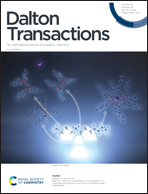Efficient electrochemical reduction of CO2 to CO in a flow cell device by a pristine Cu5tz6-cluster-based metal–organic framework†
Abstract
The electrochemical reduction of CO2 to CO is a powerful approach to achieving carbon neutrality. Herein, we report a five-nuclear copper cluster-based metal–azolate framework CuTz-1 as an electrocatalyst for the electrochemical CO2 reduction reaction. It achieved a faradaic efficiency (FE) of 62.7% for yielding CO with a partial current density of −35.1 mA cm−2 in flow cell device, which can be preserved for more than ten hours with negligible changes of the current density and FE(CO). Studies of electrocatalytic mechanism studies revealed that the distance of Cu–N was increased, and the coordination number of the Cu ion was reduced, while the oxidation state of Cu was decreased after the electrocatalysis. These findings offer valuable insights into structural changes that influence the performance of the catalyst during the process of the electrochemical reduction of CO2 process.



 Please wait while we load your content...
Please wait while we load your content...